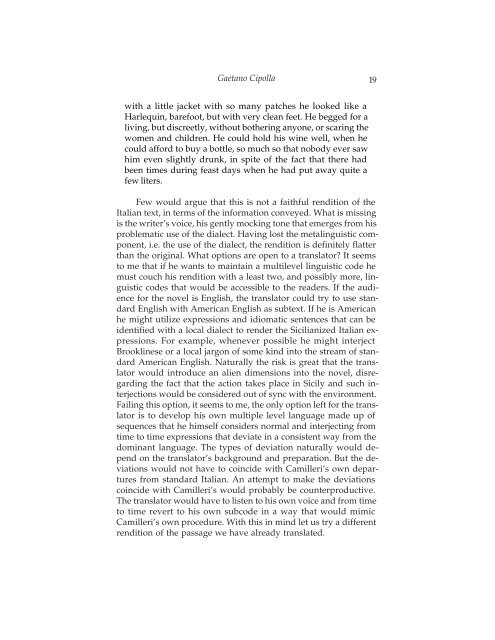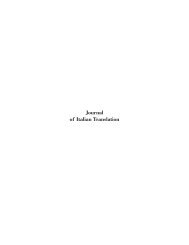Journal of Italian Translation
Journal of Italian Translation
Journal of Italian Translation
You also want an ePaper? Increase the reach of your titles
YUMPU automatically turns print PDFs into web optimized ePapers that Google loves.
Gaetano Cipolla<br />
with a little jacket with so many patches he looked like a<br />
Harlequin, barefoot, but with very clean feet. He begged for a<br />
living, but discreetly, without bothering anyone, or scaring the<br />
women and children. He could hold his wine well, when he<br />
could afford to buy a bottle, so much so that nobody ever saw<br />
him even slightly drunk, in spite <strong>of</strong> the fact that there had<br />
been times during feast days when he had put away quite a<br />
few liters.<br />
Few would argue that this is not a faithful rendition <strong>of</strong> the<br />
<strong>Italian</strong> text, in terms <strong>of</strong> the information conveyed. What is missing<br />
is the writer’s voice, his gently mocking tone that emerges from his<br />
problematic use <strong>of</strong> the dialect. Having lost the metalinguistic component,<br />
i.e. the use <strong>of</strong> the dialect, the rendition is definitely flatter<br />
than the original. What options are open to a translator? It seems<br />
to me that if he wants to maintain a multilevel linguistic code he<br />
must couch his rendition with a least two, and possibly more, linguistic<br />
codes that would be accessible to the readers. If the audience<br />
for the novel is English, the translator could try to use standard<br />
English with American English as subtext. If he is American<br />
he might utilize expressions and idiomatic sentences that can be<br />
identified with a local dialect to render the Sicilianized <strong>Italian</strong> expressions.<br />
For example, whenever possible he might interject<br />
Brooklinese or a local jargon <strong>of</strong> some kind into the stream <strong>of</strong> standard<br />
American English. Naturally the risk is great that the translator<br />
would introduce an alien dimensions into the novel, disregarding<br />
the fact that the action takes place in Sicily and such interjections<br />
would be considered out <strong>of</strong> sync with the environment.<br />
Failing this option, it seems to me, the only option left for the translator<br />
is to develop his own multiple level language made up <strong>of</strong><br />
sequences that he himself considers normal and interjecting from<br />
time to time expressions that deviate in a consistent way from the<br />
dominant language. The types <strong>of</strong> deviation naturally would depend<br />
on the translator’s background and preparation. But the deviations<br />
would not have to coincide with Camilleri’s own departures<br />
from standard <strong>Italian</strong>. An attempt to make the deviations<br />
coincide with Camilleri’s would probably be counterproductive.<br />
The translator would have to listen to his own voice and from time<br />
to time revert to his own subcode in a way that would mimic<br />
Camilleri’s own procedure. With this in mind let us try a different<br />
rendition <strong>of</strong> the passage we have already translated.<br />
19

















